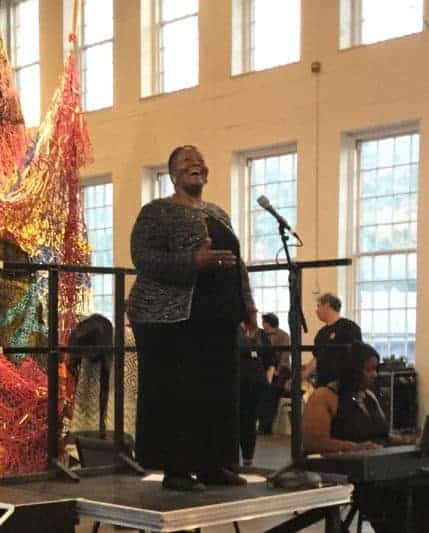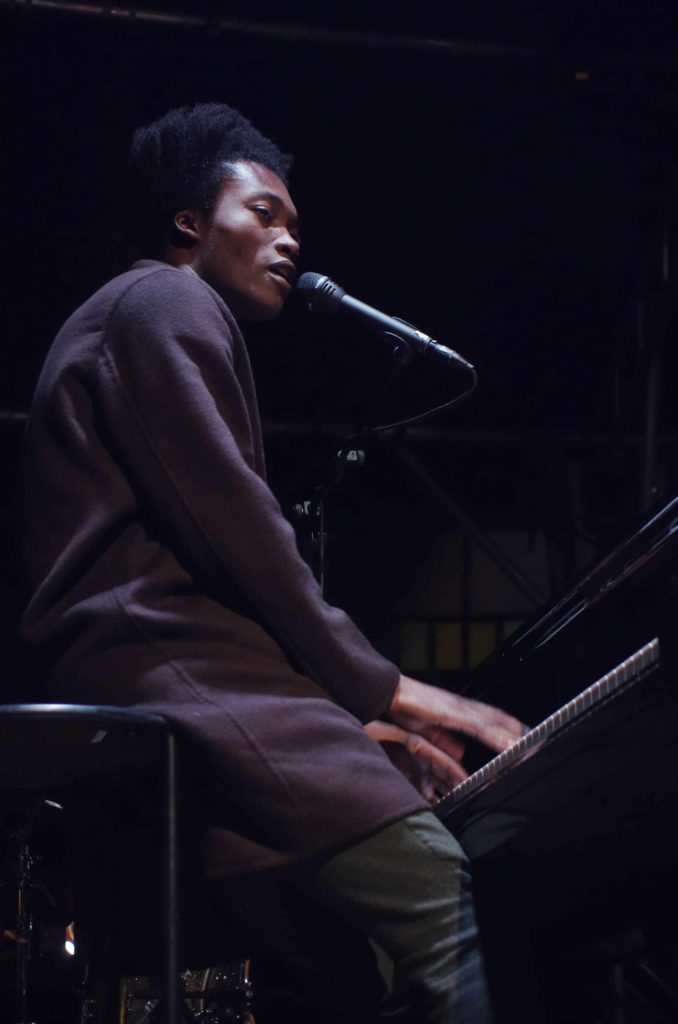This is my home — the word returns like a heart beat — home, home, home, home.
Benjamin Clementine takes his place quietly at the piano. He sits at a tall stool above the keyboard, reaching down to the keys.
With his left hand he is keeping a beat in bass chords, and with his right he builds rippling runs. And then he turns to the mic and fills the Hunter Center to the back corners as though it’s as easy as breathing.
I’ve been waiting for this for weeks. When Mass MoCA announced their fall schedule, they compared him (quoting reviews on his website) to Nina Simone, Leonard Cohen, Edith Piaf. A jazz pianist who draws on Bach, soul and the bare energy of a protest march; a street performer who won the heart of Paris; a songwriter who redefined hallelujah? Some elements of all these may have touched the music that night.
But he is himself. Tall, lean and adept, he held the stage alone.
He could move the crowd to a surge of applause and laughter with a few rueful words. Hello, America. (Shading his eyes against the stage lights.) I can’t see you.
Speaking, he could make a murmur audible across a room the size of a mill courtyard. Singing, he could shake the walls. And his words and music are his own, structured or free-form, as intelligently reflective as spoken word.
He played barefoot, sometimes putting weight into his hands, sometimes drawing toward the piano, and sometimes swinging away to reach out to the crowd.
He would sing several songs without a break, and then he would say a few words quietly about Edmonton, the rough London suburb where he spent his childhood; about North Adams on a fall afternoon and the ways architecture reflects the people who live in it; about gentrification — the places where, in the time it takes to walk to the corner store, the rent goes up by 4,000 pounds, and families have to leave their homes.
That sense of place and loss and momentum moved through his music: I won’t underestimate who I am capable of becoming.
He has won the Mercury prize for the best album from the UK and Ireland, and busked in the Paris metro, and toured the world, and now I know why.
*
And the music that night had already moved me breathless. I came for the opening to Nick Cave’s new show, ‘Until.’ It fills the Rauschenberg gallery, and everyone who walked in ahead of me stopped at the doorway and stared.
The room is full of people, remarkable enough in a gallery as large as a football field. And it is full of light.
It’s like walking into an optical mobile, a gleaming maze of spinning stars and spirals and suns on 16,000 strings. They spin like tops, and they transform under my eyes from pinwheeling color to faint lines, until they become invisible.
In some of them, at the core of the bright, layered shapes, he has set the image of a hand gun.
At the top of the steps, a concise panel explains that the name of the show, ‘Until,’ invokes the courtroom phrase ‘innocent until proven guilty.’ He created this work holding in mind the lives and deaths of Eric Garner, Oscar Grant, Trayvon Martin, Tamir Rice, Yvette Smith and Michael Brown.
Cave is known for Soundsuits, work first inspired by the Rodney King riots and by his experiences as a black man. Protective or bright, costume or armor, these suits cover the performer’s whole body, so that people become sculptures, and no one watching knows what the performer looks like. He has described this installation as bringing people “into the belly of a Soundsuit” — into the gut. Into the core. What happens when the armor comes off?
The pathway through prisms emerges into an open space. On a cloud of chandelier crystals, up sunflower-yellow ladders, he has set a kind of tropical canopy of birds and butterflies, grapes, the trumpet of a phonograph … and lawn jockeys he has deliberately transformed.
These are figurines of black men dressed as athletes. As objects on their own, they can hold troubling echoes, like the stereotypes out of minstrel shows. They are caricatures. But here, instead of lanterns, they hold butterfly nets. Cave calls them dream catchers. He is recovering them. He is not denying their troubled history; he is asking me to look them in the eye.
Standing on a platform little wider than the ladder, with a steep drop behind me, I wanted to know how Cave felt about this created world.
*
Beyond it, a woman began to sing.

Brenda Wimberly sings in the gallery at the opening of Nick Cave's 'Until' at Mass MoCA. Photo by Kate Abbott
Cave has designed this exhibit as a performance space, and people will perform here through all the exhibit’s run. On opening night, two Shreveport, Louisiana, musicians performed together: soprano Brenda Wimberly and musicologist, singer, and organist Sereca Henderson.
Wimberly too has a voice to fill a wide mill space open three floors up, as the sun is setting through a line of windows. Gospel, folk, spirituals and blues and classical music blended together. And I had heard this song sung softly at Multicultural Bridge events around the county.
It’s been too hard living, but I’m afraid to die …
It’s honest and as blunt as today’s headlines. And it was written in 1964. In her essay introducing the show, curator Denise Markonish quotes an open letter by James Baldwin — and I remember Baldwin writing another open letter to his nephew in 1962 with the love and sadness and anger of that music:
“You were born into a society which spelled out with brutal clarity and in as many ways as possible that you were a worthless human being. You were not expected to aspire to excellence. You were expected to make peace with mediocrity. Wherever you have turned, James, in your short time on this earth, you have been told where you could go and what you could do and how you could do it, where you could live and whom you could marry.”
Baldwin was writing as the Civil Rights Movement grew. He was writing that the inequality built into the structure of his own country would lead to a breakdown, if the country could not change. He could have been writing an op/ed to the Eagle today. Benjamin Clementine could sing these words tonight. He has sung his response to them.
I won’t underestimate who I am capable of becoming.
This close to November, standing inside Nick Cave’s dream in an old mill brings those words home. Barbara Wimberly is beckoning as she holds a note and lifts it up, and up again.
And I want to bring that night alive to everyone I can reach, until they can feel that music grip them high in the chest. Until it’s been a long time coming rings in a high, clear lament. Until it makes their breath come short. Until they clap until their hands glow.
To stand in a room packed with people in North Adams on a fall night, right now, before the election, and hear Brenda Wimberly sing Sam Cooke’s A Change is Gonna Come and fill that giant room with her voice and the applause that answered her … brought me near tears.


